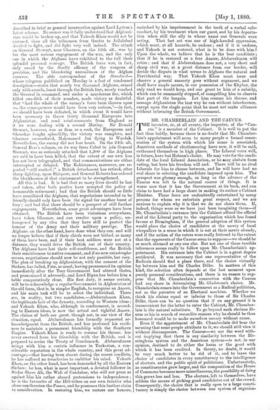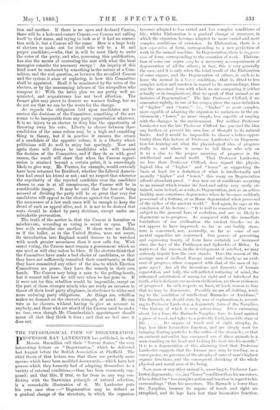MR. CHAMBERLAIN AND THE CAUCUS.
THE inventor, or, at all events, the importer, of the " Cau- cus " is a member of the Cabinet. It is well to put the fact thus boldly, because there is no doubt that Mr. Chamber- lain's appointment will seem to many people a formal conse- cration of the system with which his name is associated. American methods of electioneering have now, it will be said, enthroned themselves in high places. The Liberal voter will, in future, have but Hobson's choice. He may vote for the candi- date of the local Liberal Association, or he may abstain from voting, but here his freedom will end. There will be no rival Liberals for him to choose between, and he will have had no real share in selecting the candidate imposed upon him. The prospect was gloomy enough, so long as the advance of the Caucus was left to the natural course of things. It is worse now that it has the Government at its back, and can claim to have had a large share in making its author a Cabinet Minister. These fears are undoubtedly entertained by many persons for whom we entertain great respect, and we are anxious to explain why it is that we do not share them. If, indeed, things were as we have just been imagining them—if
Mr. Chamberlain's entrance into the Cabinet affixed the official seal of the Liberal party to the organisation which has found favour at Birmingham, if the general adoption of this system would place the choice of candidates at the mercy of local wirepullers in a sense in which it is not at their mercy already, and if the action of the voters were really fettered to the extent that the opponents of the Caucus seem to suppose—we should be as much alarmed as any one else. But not one of these terrible inferences seems really to follow upon Mr. Chamberlain's ap- pointment. His entrance into the Cabinet is in a great degree accidental. It was necessary that one representative of the Radicals should find a place there, and the choice virtually lay between him and Sir Charles Dilke. In matters of this kind, the selection often depends at the last moment upon purely personal considerations, and there is no reason to sup- pose that Mr. Chamberlain's connection with the Caucus had any share in determining Mr. Gladstone's choice. Mr. Chamberlain comes into the Government as a Radical politician, not as the patentee of an Electoral machine. Whether we think his claims equal or inferior to those of Sir Charles Dilke, there can be no question that if on any ground it is inconvenient for the latter to enter the Cabinet, Mr. Chamber- lain is the natural substitute. To go beyond such obvious fit- ness as his in search of recondite reasons why he should be thus honoured would be to make ourselves uneasy without cause.
Even if the appointment of Mr. Chamberlain did bear the meaning that some people attribute to it, we should still view it without discomposure. The Caucus—we use the word with- out implying that there is any similarity between the Bir- mingham system and the American system—is not, in our opinion, destined to do either the harm or the good with which it has been credited. In theory, no doubt, it would be very much better to be rid of it, and to leave the choice of candidates in every constituency to the intelligence of electors, and the public spirit of politicians. Unfortunately, as constituencies grow larger, and the composition of the House of Commons becomes more miscellaneous, the possibility of doing this grows less and less. The electors, left to themselves, have seldom the means of picking good candidates out of the crowd. Consequently, the choice that is really open to a large consti- tuency is simply the choice between one system of orgamsa- tion and another. If there is no open and declared Caucus, there will be a hole-and-corner Caucus,—a Caucus not calling itself by that name, and trying to look as if it had no connec- tion with it, but a Caucus all the same. How is a large body of electors to make out for itself who will be a fit and proper candidate,—who, that is, will be most likely to unite the votes of the party, and who, possessing this qualification, has also the means of contesting the seat with what the local managers consider the necessary energy ? An inquiry of this kind must be conducted by something in the nature of a Com- mittee, and the real question, as between the so-called Caucus and the system it aims at replacing, is how this Committee shall be appointed. Shall it be nominated by the votes of the electors, or by the unassuming labours of the wirepullers who compose it ? With the latter plan we are pretty well ac- quainted, and acquaintance has not bred affection. The former plan may prove to deserve no warmer feeling, but we do not see that we can be the worse for the change.
As regards the obligation laid upon candidates not to contest the decisions of the Committee, something of the sort seems to be inseparable from any party organisation whatever. It is no injury to an elector to deny him the opportunity of throwing away his vote. Liberty to choose between three candidates of the same colour may be a high and ennobling thing in theory, but if in practice it ensures the return of a candidate of the opposite colour, it is a liberty which politicians will do well to enjoy but sparingly. Now and again there will always be candidates who will contest the decision of the Committee, and if they do so with good reason, the result will show that when the Caucus organi- sation is strained beyond a certain point, it is exceedingly likely to give way. Mr. Forster, for example, would certainly have been returned for Bradford, whether the Liberal Associa- tion had stood his friend or not ; and we suspect that wherever the superiority of the rejected candidate over the candidate chosen to run is at all conspicuous, the Caucus will be in considerable danger. It may be said that the fear of being accused of dividing the party will be so great that very few candidates will appeal to the electors against the Caucus. But the occurrence of a few such cases will be enough to keep the dread of such an appeal alive, and it is not to be desired that seats should be risked by party divisions, except under un- mistakable provocation.
The truth of the matter is, that the Caucus is harmless or mischievous, according as voting is secret or open. The two evils neutralise one another. If there were no Ballot, or if the ballot, as in the United States, were not secret, its introduction into England would deserve to be watched with much greater uneasiness than it now calls for. With secret voting, the Caucus must remain a government which no one need or will obey unless he likes. If the electors think that the Committee have made a bad choice of candidates, or that they have not sufficiently consulted their constituents, or that they have committed any other of the sins to which Election Committees are prone, they have the remedy in their own hands. The Caucus may bring a man to the polling-booth, but it cannot tell how he will vote when he has gone in. If it were not for this, rebellion would be impossible, except on the part of those stronger minds who are ready on occasion to throw off their local party allegiance, in obedience to wider and more enduring party obligations. As things are, rebellion makes no demand on the elector's strength of mind. He can vote as he chooses, without having to give an account to anybody, and those who are afraid of the Caucus need be under no fear, even though Mr. Chamberlain's appointment should mean all that they think it does ; and that we feel sure it does not.



































 Previous page
Previous page